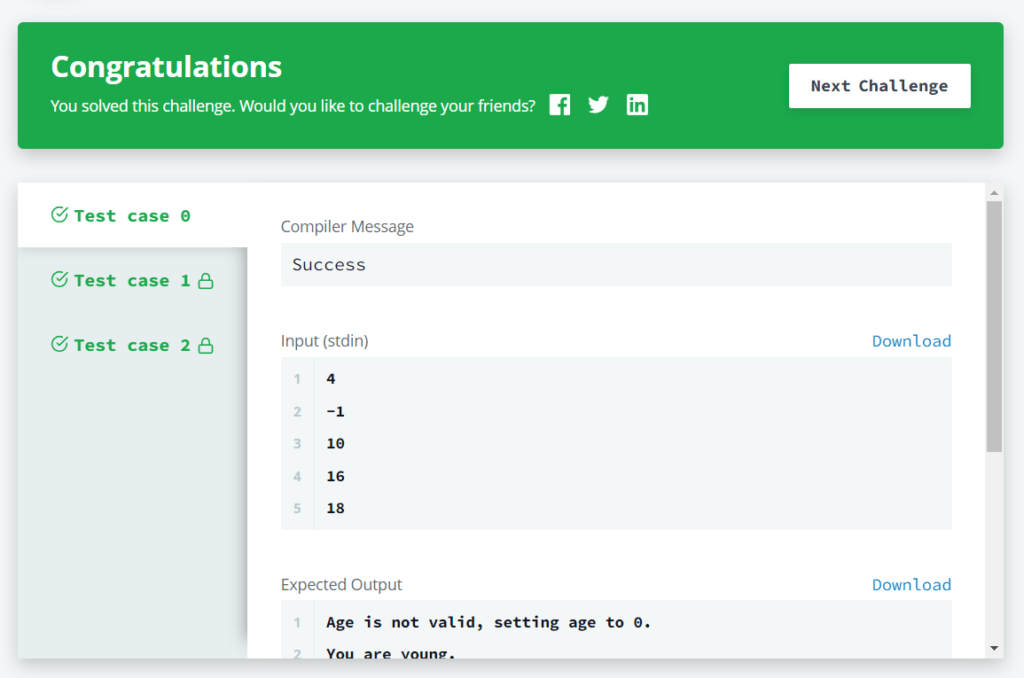In this article, we will be solving HackerRank Day 4: Class vs. Instance problem, part of 30 Days of Code. Majorly, we will use Python3 and Java15 to solve the problem.
Objective
In this challenge, we’re going to learn about the difference between a class and an instance; because this is an Object-Oriented concept, it’s only enabled in certain languages. Check out the Tutorial tab for learning materials and an instructional video!
Task
Write a Person class with an instance variable, age, and a constructor that takes an integer, initialAge, as a parameter. The constructor must assign initialAge to age after confirming the argument passed as initialAge is not negative; if a negative argument is passed as initialAge, the constructor should set age to 0 and print Age is not valid, setting age to 0.. In addition, you must write the following instance methods:
- yearPassed() should increase the age instance variable by 1.
- amIOld() should perform the following conditional actions:
- If age < 13, print
You are young.. - If age >= 13 and age < 18, print
You are a teenager.. - Otherwise, print
You are old..
- If age < 13, print
To help you learn by example and complete this challenge, much of the code is provided for you, but you’ll be writing everything in the future. The code that creates each instance of your Person class is in the main method. Don’t worry if you don’t understand it all quite yet!
Note: Do not remove or alter the stub code in the editor.
Input Format
Input is handled for you by the stub code in the editor.
The first line contains an integer, T (the number of test cases), and the T subsequent lines each contain an integer denoting the age of a Person instance.
Constraints
- 1 <= T <= 4
- -5 <= age <= 30
Output Format
Complete the method definitions provided in the editor so they meet the specifications outlined above; the code to test your work is already in the editor. If your methods are implemented correctly, each test case will print 2 or 3 lines (depending on whether or not a valid initialAge was passed to the constructor).
Sample Input
4
-1
10
16
18Sample Output
Age is not valid, setting age to 0.
You are young.
You are young.
You are young.
You are a teenager.
You are a teenager.
You are old.
You are old.
You are old.Explanation
Test Case 0: initialAge = -1
Because intialAge < 0, our code must set age to 0 and print the “Age is not valid…” message followed by the young message. Three years pass and age = 3, so we print the young message again.
Test Case 1: initialAge = 10
Because initialAge < 13, our code should print that the person is young. Three years pass and age = 13, so we print that the person is now a teenager.
Test Case 2: initialAge = 10
Because 13 <= initialAge < 18, our code should print that the person is a teenager. Three years pass and age = 19, so we print that the person is old.
Test Case 3: initialAge = 18
Because initialAge >= 18, our code should print that the person is old. Three years pass and the person is still old at age = 21, so we print the old message again.
The extra line at the end of the output is supposed to be there and is trimmed before being compared against the test case’s expected output. If you’re failing this challenge, check your logic and review your print statements for spelling errors.
You can find all the source code on my GitHub profile: https://github.com/uttammanani/HackerRank-30-Days-of-Code
Solution Day 4: Class vs. Instance in Python3
class Person:
def __init__(self,initialAge):
# Add some more code to run some checks on initialAge
if(initialAge<0):
self.age=0
print("Age is not valid, setting age to 0.")
else:
self.age = initialAge
def amIOld(self):
# Do some computations in here and print out the correct statement to the console
if (self.age<13):
print("You are young.")
elif(self.age>=13 and self.age<18):
print("You are a teenager.")
else:
print("You are old.")
def yearPasses(self):
# Increment the age of the person in here
self.age += + 1
t = int(input())
for i in range(0, t):
age = int(input())
p = Person(age)
p.amIOld()
for j in range(0, 3):
p.yearPasses()
p.amIOld()
print("")Solution Day 4: Class vs. Instance in Java15
import java.io.*;
import java.util.*;
public class Solution{
static class Person{
private int age;
public Person(int initialAge){
// Add some more code to run some checks on initialAge
if (initialAge > 0){
age = initialAge;
}
else {
System.out.println("Age is not valid, setting age to 0.");
age = 0;
}
}
public void amIOld(){
// Write code determining if this person's age is old and print the correct statement:
if (age < 13){
System.out.println("You are young.");
}
else if (age >= 13 && age < 18){
System.out.println("You are a teenager.");
}
else{
System.out.println("You are old.");
}
}
public void yearPasses(){
// Increment this person's age.
age++;
}
}
public static void main(String[] args){
Scanner sc = new Scanner(System.in);
int T = sc.nextInt();
for (int i = 0; i < T; i++){
int age = sc.nextInt();
Person p = new Person(age);
p.amIOld();
for (int j = 0; j < 3; j++){
p.yearPasses();
}
p.amIOld();
System.out.println();
}
sc.close();
}
}

We hope that we bring some value to your life through posting our content, might content meet your expectations. You can always comment on the post to give feedback or reach out to us through email for sharing what you like to read on our blog.
Reach out to us using email: [email protected]
Find More Articles on Our Website: EGrasps
Check out our other posts on Medium.
You can reach out to us on WhatsApp.



